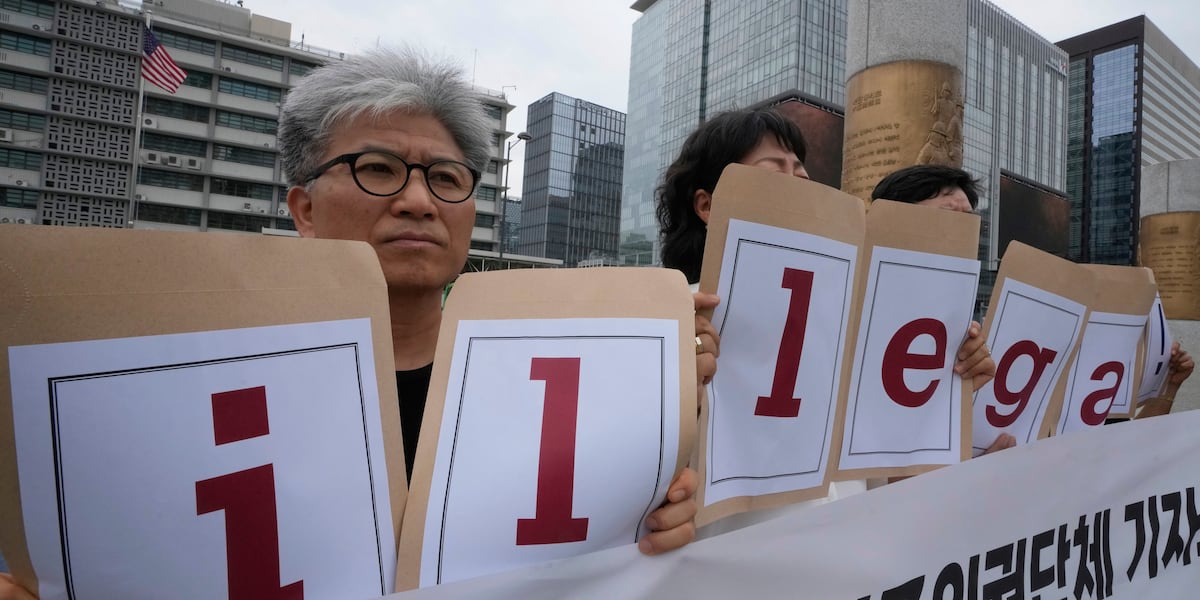Why Did South Korea Dispatch a Plane to Rescue Workers from US Immigration Raids?

Published: 2025-09-10 02:56:17 | Category: policy GNEWS Search
This article discusses the recent immigration raid in Georgia, where a significant number of South Korean workers were detained by U.S. authorities, highlighting the implications for the U.S.-South Korea relationship and the steps being taken for their return.
Last updated: 12 October 2023 (BST)
Key Takeaways
- A South Korean charter plane has been dispatched to repatriate detained workers from Georgia.
- The raid on September 4 involved 475 workers, predominantly South Koreans.
- The incident has sparked outrage in South Korea, with implications for U.S.-South Korea relations.
- Experts believe retaliatory actions from South Korea are unlikely due to strong ties with the U.S.
- South Korea is seeking to improve systems to prevent future incidents.
The Immigration Raid: An Overview
On September 4, a large-scale immigration raid conducted by U.S. authorities targeted a battery factory under construction in Georgia, resulting in the detention of 475 workers. Among those detained, over 300 were reported to be South Korean nationals. The raid, executed by the Department of Homeland Security (DHS), has been described as the largest of its kind, aligning with the U.S. government's aggressive stance on deportation.
Video footage released by U.S. authorities showing detained workers being shackled has stirred significant outrage and distress within South Korea. This incident not only highlights the complexities of immigration enforcement in the U.S. but also raises questions about the treatment of foreign workers and the implications for international relations.
The Impact on U.S.-South Korea Relations
The fallout from the Georgia raid poses potential risks to the historically strong alliance between South Korea and the United States. The two nations have long enjoyed a partnership rooted in mutual defence and economic cooperation, with the U.S. maintaining a military presence in South Korea since the Korean War. However, incidents like this can strain diplomatic ties, as they evoke feelings of betrayal among South Koreans.
President Donald Trump's administration has adopted a stringent immigration policy, emphasising the need for American workers to be trained for specialised jobs. This view was reflected in his comments regarding the legality of the detained workers' presence in the U.S. Many South Koreans, however, argue that the skilled workers were necessary for the construction and maintenance of advanced equipment, as no domestic companies possess the requisite machinery or expertise for such tasks.
The Government's Response
In response to the raid, South Korea's government swiftly organised a charter flight to bring back the detained workers. This move demonstrates a commitment to safeguarding its citizens and addressing the fallout from the incident. South Korea's Foreign Ministry had been negotiating with U.S. authorities for the workers' release, which culminated in the charter plane's departure from Incheon International Airport.
South Korean President Lee Jae Myung expressed his deep concern over the incident, acknowledging his government's responsibility to ensure that such events do not reoccur. He signalled intentions to work closely with the U.S. to improve systems that could prevent similar situations in the future.
Public Sentiment in South Korea
The public reaction in South Korea has been one of shock and indignation, with many citizens viewing the raid as a national disgrace. Surveys indicate that the majority of South Koreans still support the alliance with the U.S., but incidents like this can sow seeds of doubt and resentment. Public sentiment is crucial, as it influences the government's approach to diplomacy and international relations.
Experts suggest that while South Korea is unlikely to pursue significant retaliatory measures against the U.S., the incident could lead to increased scrutiny of American policies and practices. The relationship between the two nations, while resilient, could experience strains if similar actions are repeated.
What Happens Next?
As the charter flight is set to return to South Korea with the detained workers, the immediate focus shifts to their reintegration and the implications for South Korean businesses operating in the U.S. The incident has highlighted the vulnerabilities that foreign workers face in the current immigration climate, prompting discussions about better protections and support for such workers.
In the longer term, both governments may need to reassess their policies to ensure that the needs of industries reliant on skilled labour are adequately addressed. The South Korean government is likely to push for measures to enhance bilateral cooperation in training domestic workers for specialised jobs, thereby reducing reliance on foreign expertise.
Conclusion: A Call for Dialogue
The Georgia immigration raid has illuminated critical issues surrounding immigration enforcement and its impact on international relations. As both nations navigate this complex landscape, fostering open dialogue and understanding will be essential in preserving their partnership. The hope is that both governments can learn from this incident to prevent future occurrences that could jeopardise their longstanding alliance.
How will this incident reshape the future of U.S.-South Korea relations? The outcome remains uncertain, but it certainly underscores the need for ongoing communication and collaboration between the two allies. #SouthKorea #USRelations #ImmigrationPolicy
FAQs
What was the reason for the immigration raid in Georgia?
The immigration raid was conducted by U.S. authorities as part of a crackdown on illegal immigration, targeting workers at a battery factory under construction. Over 300 South Korean nationals were among those detained.
How did the South Korean government respond to the raid?
The South Korean government quickly organised a charter plane to repatriate the detained workers and expressed its commitment to prevent similar incidents in the future while engaging in discussions with U.S. authorities.
What are the implications of the raid for U.S.-South Korea relations?
The raid has sparked outrage in South Korea, raising concerns about the impact on the historically strong alliance. While retaliatory measures are unlikely, the incident could strain diplomatic relations if similar actions occur again.
How many workers were detained during the raid?
A total of 475 workers were detained during the raid, with more than 300 of them being South Korean nationals.
What skills do the detained workers possess?
The detained workers were skilled technicians necessary for the installation and repair of specialised equipment at the battery factory, which U.S. companies currently lack the capacity to manage independently.



